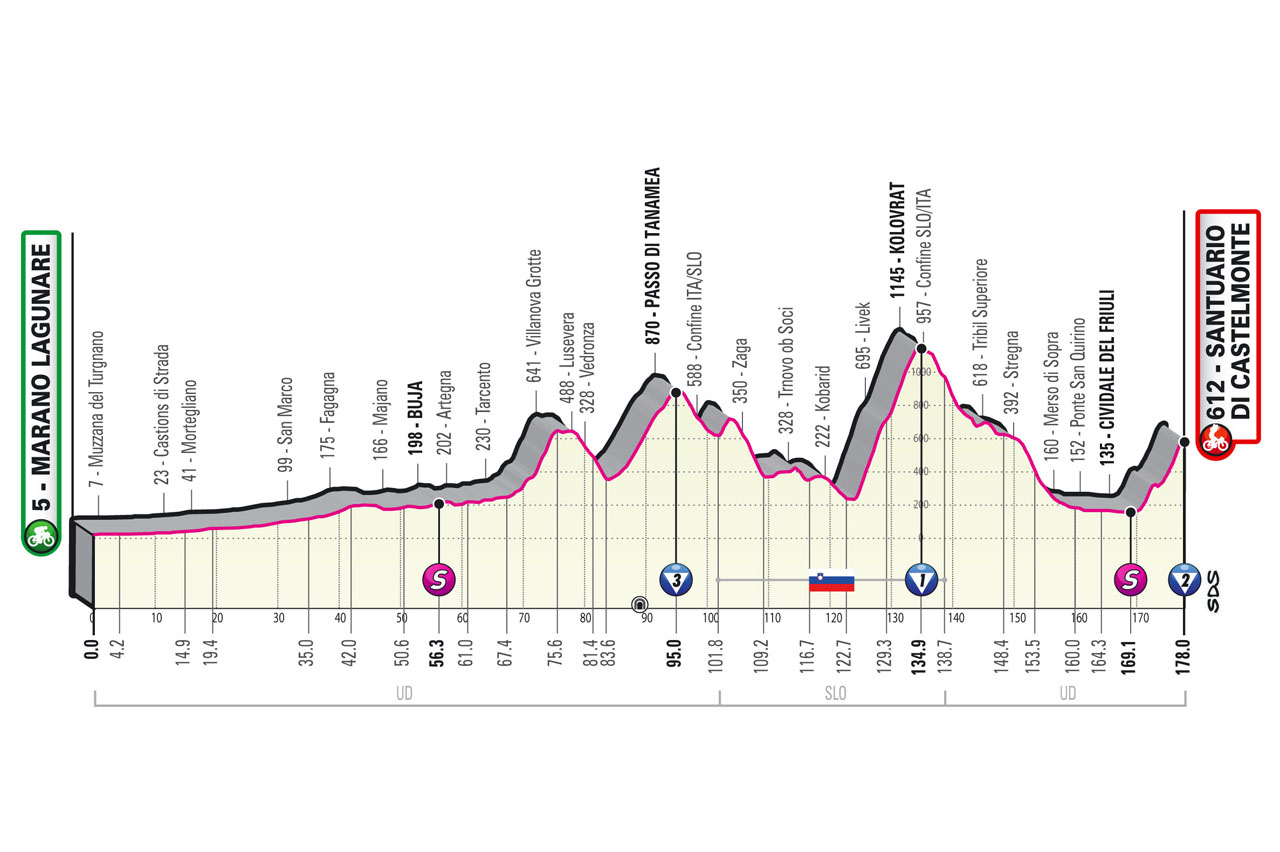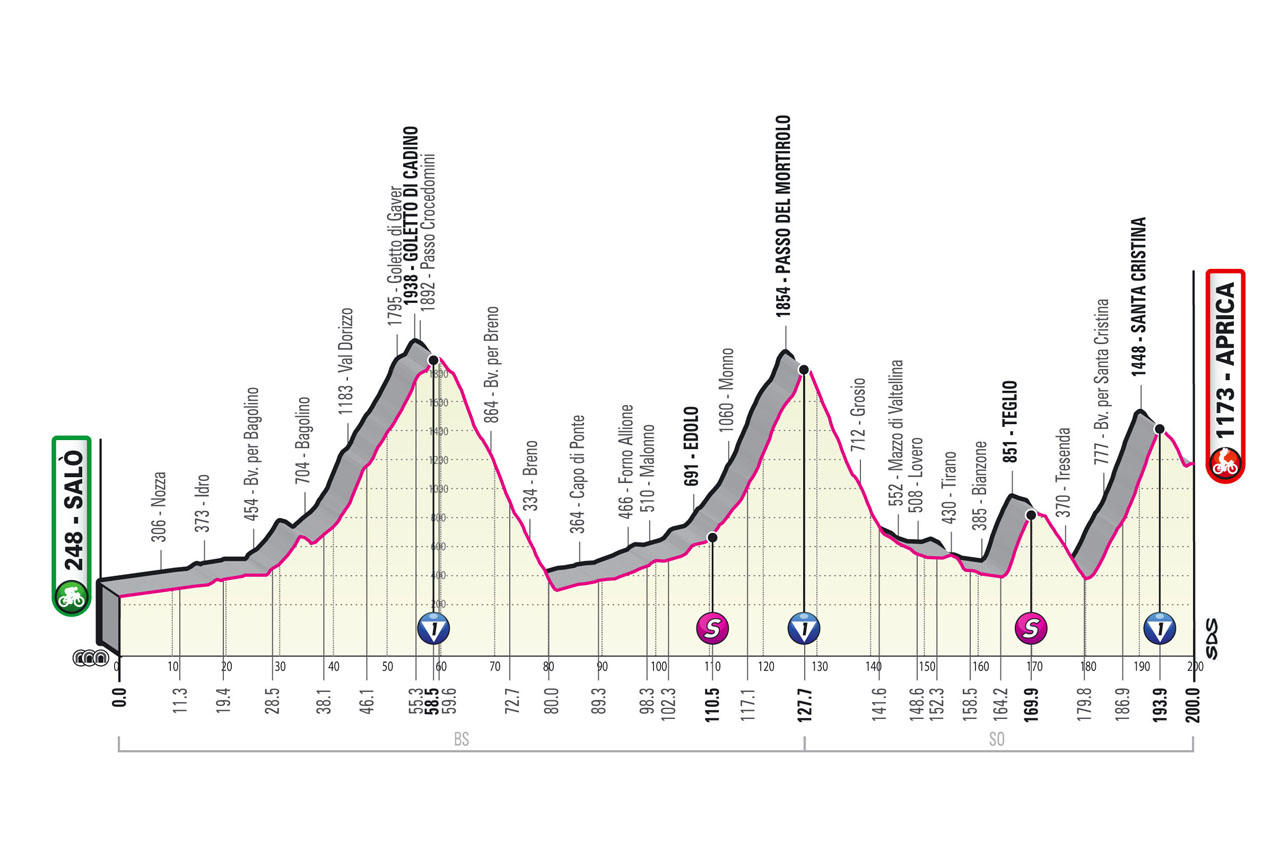Two weeks of waiting, two weeks of skirmishes, two weeks of trying to figure out who could win the Giro d’Italia 2022 and who had no chance. This year more than ever, the third week comes to dispel many doubts, which at the moment, with a still very short GC, are plenty. The gaps in the general classification are destined to grow given what awaits the peloton in the final week, but the balance seen so far will push the contenders for the final victory to come up with something and give everything they have left.
After the rest day, the race will start again with a big stage offering 5250 metres of elevation gain, the 202-kilometre Salò-Aprica. On the programme there are the climbs of Goletto di Cadino (1st cat., 20 km at 6%), the Mortirolo Pass from Monno (1st cat., 12.6 km at 7.6%), to be overcome at 72 km from the arrival, then the climb of Teglio (5.6 km at 8.2%), not catalogued as a KOM, and above all the Valico di Santa Cristina (1st cat, 13.5 km at 8%), which will be climbed at 7 km to go, with a short but steep descent that will take the riders to the finish line. A stage which, on the climbs that consecrated Marco Pantani, is destined to make big differences.
On Wednesday 25 May, the story does not change, with the 168-kilometre Ponte di Legno-Lavarone. The start is immediately uphill, tackling the historic Passo del Tonale (8.6 km 6.3%), but the last 45 km are the highlight of the day, first with the Valico del Vetriolo (1st cat., 11.8 km at 7.7%), to be climbed 34 km from the finish, and then Monte Rovere, known by the representative name of Menador, 8 km of climbing at 10%. The climb will end with 8 km to go, after which it will be slight slope all the way to the end. Athis point, with two such stages in a row, the idea of who can actually carry the Maglia Rosa all the way to Verona will probably be much clearer.
After 48 hours of tussle, the peloton will breathe again in the 156km Borgo Valsugana-Treviso, the last chance for the sprinters to try and make their mark. The stage features a couple of fourth-category KOMs in the central part of the route, but these should not cause any problems for the remaining sprinters.
Attention also needs to be paid to the following day’s stage, the 178-kilometre Marano Lagunare-Santuario di Castelmonte which, while probably the least feared – after Treviso, of course – of the last week, does present some pitfalls. The stage will cross into Slovenia for just under 40 kilometres (get ready for a crowd of Slovenian fans) and it is in the town of Tadej Pogacar and Primoz Roglic that the tough climb of Kolovrat (1st cat., 10.3 km at 9.2%) will be tackled, 44 km from the finish. And then the finish will be uphill, at the Sanctuary of Castelmonte (2nd cat. 7.1 km at 7.8%), with the second part of the climb more complicated and therefore destined to create some small gaps among the GC the men.
The 20th stage is the most eagerly awaited, it is the Dolomite tappone (although not too long), the one with the passes that have made the history of this sport, the one that in the collective imagination is the emblem of the Giro d’Italia, ‘the world’s toughest race in the world’s most beautiful country’. The 168 km Belluno-Marmolada will feature in the last 80 km the San Pellegrino Pass (1st cat., 18.5 km at 6.2%), the Pordoi Pass (11.8 km at 6.8%), this year’s Cima Coppi, and, finally, the fascinating climb to the Fedaia Pass, the Marmolada (1st cat, 14 km at 7.6%), with the last 6 km constantly above 10% and the well-known Malga Ciapela straight leading to the finish, about three kilometres almost completely straight at an average gradient of over 12% and a maximum of 15%. This is one of the most difficult stretches of all the Dolomite climbs. Winning a stage like this gives you the incontrovertible right to become part of the Giro d’Italia legend.
The grand finale will be in Verona, three years after the last time. A 17.4-kilometre time trial on the Torricelle world circuit in an anti-clockwise direction, with the finish in Piazza Bra and the striking Arena di Verona, which will also host the final prize-giving ceremony. After a week with so many climbs, it seems complicated to think that a short time trial like this could prove decisive but cycling – and the Giro d’Italia above all – are beautiful precisely because they are completely unpredictable. Let’s get ready for six pulse-pounding days.













































































